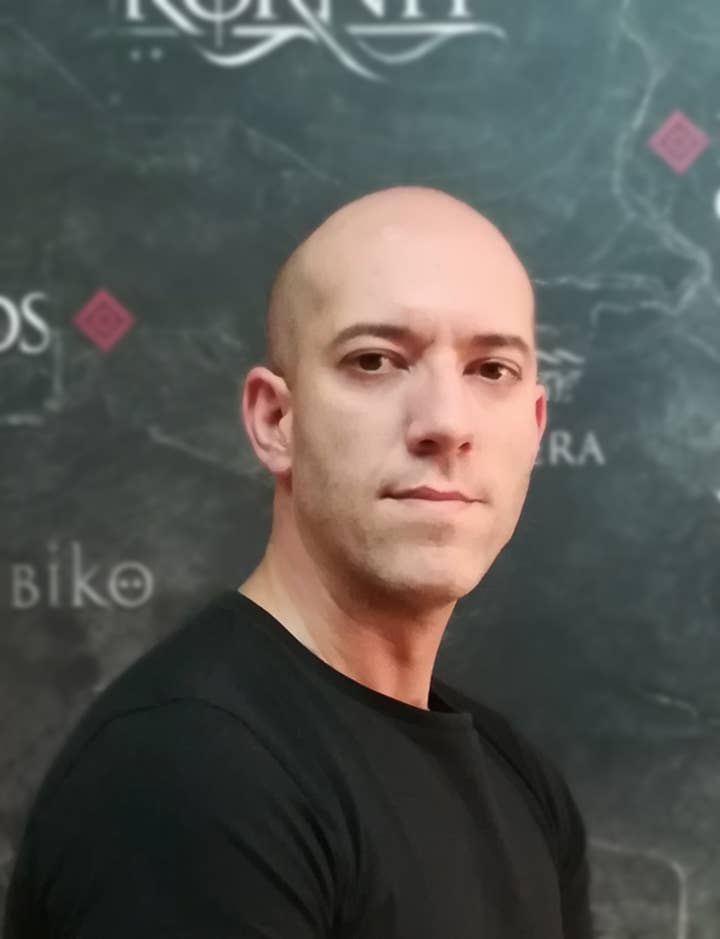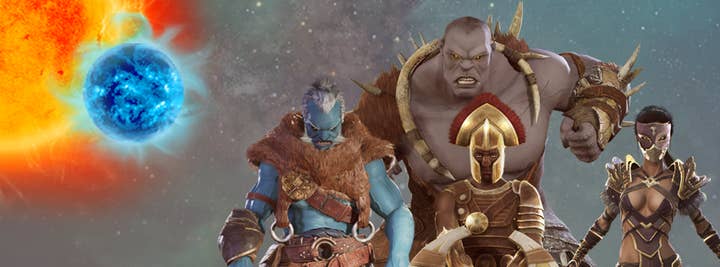The Leeroy Jenkins approach to world-building
Skara: The Blade Remains developer 8-Bit Studio tells us how it's enabling players to shape the lore and story on its online fantasy battler
The Steam page for Skara: The Blade Remains states the game is set in "a fantasy world [where the] future is by influenced players". It's a fanciful marketing hook and one that no doubt intrigues players, but what does it actually mean?
In an age of long-tail service-based games driven by their communities, it's a given that user feedback will shape the actual structure, mechanics and quality of the game, but Spanish indie 8-Bit Studio wants to take that one step further.
Skara: The Blade Remains is a team-based arena battler where players choose from various races and heroes, and fight to the death in rapid skirmishes of no more than ten minutes. While the gameplay is entirely focused on the arena, 8-Bit Studio has worked hard to create context for the battles and the world in which they take place.

The idea of allowing players to shape that story was a focal point from the very beginning, CEO and creative director Pablo Rodriguez tells GamesIndustry.biz, and the foundations were laid in some of the earlier events in the game's alpha.
"All the players who won events immediately became part of the official lore of the game," he explains. "The main story is evolving with them as the protagonists."
This philosophy goes beyond the game. Earlier this year, the studio released its first novel based on the world of Skara - The Time of the Two Suns - thanks to a partnership with Planeta, Spain's biggest book publisher and the fourth largest in the world. Some of the characters in this story are based directly on early adopters and Kickstarter backers.
"They are in the lore and everyone in the game knows who they are," Rodriguez continues. "That is really interesting and we want to keep growing on that side. If you go to the Wikia for Skara, you will see there are stories featuring all these winners of the events of the alpha. Some of the players are writing the stories of their own character.
"Players create their own lore. What we are basically doing is taking that and making it official in the game. It's like what happened with Leeroy Jenkins"
"That's something that I, as being responsible for the lore, can take some of these background stories from characters and bring them to the main plot. It is super interesting because I get to talk with them on a daily basis, so I know them, I know their characters, I know the players, who they are comfortable playing and those who are enemies inside the game. If I know two players have been enemies, working in a particular server, I am going to make their characters enemies as well in the lore."
It's a neat hook that instantly gets players more engaged with the fiction of Skara, driven by the idea that they might one day be immortalised in the tale it tells. This gives 8-Bit a distinct advantage in one of the toughest aspects of creating a new IP: establishing a compelling world. With so many fantasy universes already well established in the realm of video games - Hyrule, Tamriel, Azeroth, Lordan, Thedas... need I go on? - it's a terrifying task.
For Rodriguez, involving the players in this process is not just innovative - it's inevitable.

"It's going to happen even if you don't have a lore in your game," he says. "World of Warcraft obviously has a rich world, but players create their own lore based on the people they play with in their servers. What we are basically doing is taking that and making it official in the game. It's like what happened with Leeroy Jenkins. But making that on purpose from the very beginning, that was the main idea."

Studio founder Cesar Ortega discusses the next step: "We are doing everything that we can but at the end of the day, in order to take it forward, you need third-party validation. Players like it a lot, now you need to find companies who can help you take it to the next level.
"In our case, we did find Planeta who has distributed our first book which was launched three weeks ago. Now we are already talking to big screen producers about potentially taking it to another level. We can't say anything yet, but hopefully we'll get that done and we'll reinforce our lore by extending it into different channels and getting more people to know about it."
There's a trap many first-time fantasy writers fall into, known as 'world-building disease': spending so much time on developing the background details of your setting that the story itself never gets written (or, at least, not as efficiently as it could be). It would be easy to assume games developers can fall into the same trap when developing a new IP, but Rodriguez argues that there is "never enough world-building."
He continues: "It provides so much useful background for the artists and for the designers in order to create new maps and new characters. In order to create new features or even game modes, they can find valuable information on the lore and the novel that they can use to make a really rich world instead of adapting the lore to the things that the design team comes up with. It's better the other way around. I can provide them with ammunition to do creative work."
"I can take some of these background stories from characters and bring them to the main plot.. If I know two players have been enemies, working in a particular server, I am going to make their characters enemies as well in the lore"
Ortega adds: "In [the novel's] case it was quite easy because the book publisher said it needed to be a certain number of pages. Pablo had to start trimming down."
Pablo laughs: "I cut 150 pages from the novel. It was already too long. We can always release an extended version, right?"
Skara: The Blade Remains first entered Early Access in 2016, and two years on there's no firm date on when it might get a full release. It's currently enjoyed by more than 350,000 people - plenty of potential characters for Rodriguez - but 8-Bit has encountered some issues meeting their expectations.
"When you see our game, most of the players immediately compare us to bigger budget teams, with For Honor, with Nosgoth, for example," says Rodriguez. "There were 80 people developing that game - we are 20.
"They don't realise that we are a small team until we talk with them directly. They were expecting a super polished beta version of the game in Early Access, which is what other teams do with bigger budgets. But once we get to talk to them, and we do that on a daily basis, it worked really well and the community is super committed."
Cesar adds: "Because we are fully independent, we cannot work behind the scenes for five years and then release a final or almost final product. We decided to work with the community very early on, releasing a very early pre-alpha of our game. That's why it feels like it's been around forever. To be honest, we have been developing for just over four-and-a-half years. That's probably why.
While direct communication with players reveals how limited the team's resources are, Rodriguez doubts there are many other ways to emphasise this when promoting the game. It's clarified on the website, it's mentioned in every interview, yet still players make their own assumptions based on how they view the game.
"The problem - it's not really a problem - is that a lot of people discover our game because they see us at events, they go online, YouTubers play our game," says Rodriguez. "But unfortunately there's not much we can control in terms of what people say about us, unless it's an interview we have given. It's a bit tricky. I don't think we should spend a lot of time trying to convince other people. To be honest, we are hoping to get to that level of quality anyway. It's just going to take us a bit longer, I guess."
